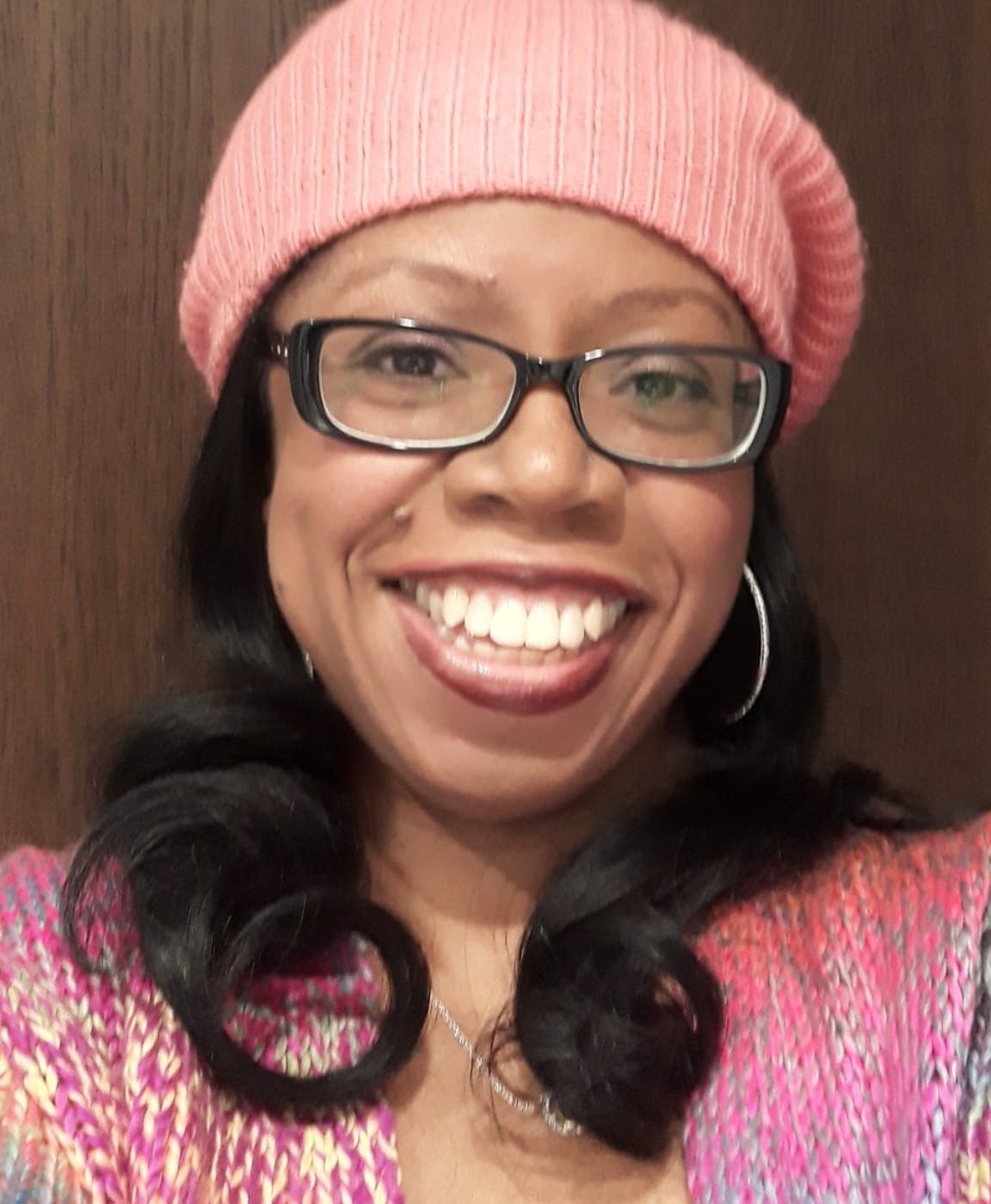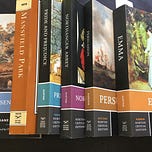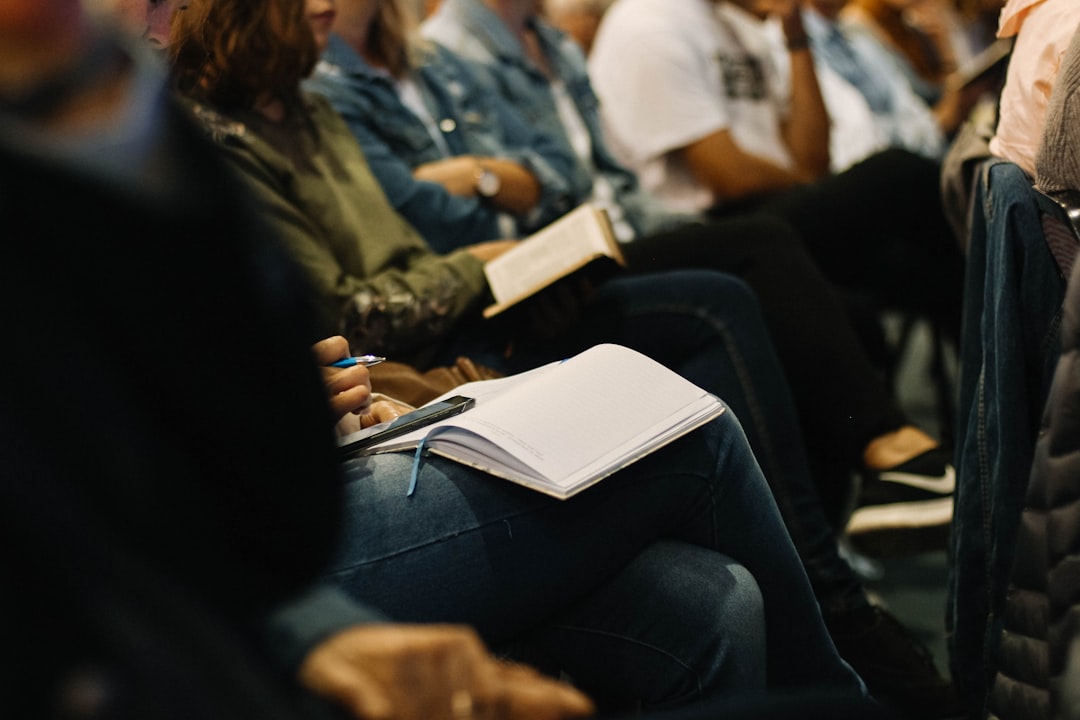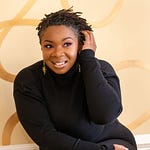Hello friends,
Today we bring a new podcast episode and conversation that I think you will love. It’s with Damianne Scott, an educator, writer and speaker in the Jane Austen community - she teaches literature at the University of Cincinnati Blue Ash College and Cincinnati State University. And she’s the host of the Facebook page, Black Girl Loves Jane.

She’s also working on a very intriguing project right now - rewriting the story of Jane Austen’s Persuasion into the setting of an African-American megachurch.
In her own book project, Persuaded, due out from Meryton Press next year, Ms. Scott makes Anne Elliot a PK - or preacher’s kid. And as Dr. Cornell West has pointed out, in a legendary talk at the JASNA Annual General Meeting of 2012, Jane Austen was also a PK, or preacher’s kid.
This is a world that Damianne Scott knows well, and it’s a world I also am not unfamiliar with - I also, as it happens, am a PK - so I really enjoyed this conversation.
Ms. Scott says that as a student of 19th century literature, which she has loved since middle school, she often has found herself the only Black student in the room. So she appreciates the nontraditional casting of shows like Bridgerton, but has also watched and addressed the backlash that has arisen from that production and from the PBS series Sanditon.
An article Damianne Scott contributed to JASNA.org, or the Jane Austen Society of North America online, addressed the pineapple controversy surrounding the Sanditon series. A chorus of viewers felt that using the pineapple emoji as a fan symbol for the show was insensitive to the cultural weight and the connotations of colonialism and of the slave trade carried by that symbol. Damianne Scott weighed in, and she weighs in here, in this conversation, saying she hopes people and the community of Austen lovers and fans will continue to grow and understand that - as she says - Austen doesn't want to be put up on a pedestal: Jane Austen, she says, wants to be among the people. I love that.
Press play here (above) to stream this from any device, or find the Austen Connection podcast on Spotify or Apple. Enjoy!
And for you word lovers, here’s an excerpt from our conversation:
Plain Jane
Let me talk a little bit first about Persuasion. So why do you love the story of Persuasion?
Damianne Scott
Well, I love the story of Persuasion … It was my first Jane Austen novel that I read in college. And the first one I did a paper on. So that was one reason why I loved it.
Second, I do enjoy the movie, the one that [from 1995], with Ciarán Hinds, the BBC, is one of my favorite adaptations.
And then I like it now. Because Anne Elliot is very adaptable for any woman today, who is over a certain age who is not married, who has no children, and who has come to bear the responsibility - either willingly or unwillingly - to be the caregiver of their parents, and their finances, the dependable child in the household.
And I find that very relatable to me, because I am not married, have no children, and have become the pseudo-caregiver [and] financial-responsibility person, in my family.
So it speaks to me.
The other thing is, I think that Persuasion in itself, again, is very adaptable to what I'm doing now with my rewriting of it and modernizing it.
Anne - she's always criticized by her father for the way she looks. There's that famous scene where, you know, she's talking, and he's like, “Oh, your skin looks better today, you changed cold creams”! And he talks about the naval officers, and he talks about Admiral Croft and how, you know, he looks pretty well for somebody who was in the Navy!
Plain Jane
And it's very funny, like, it's a source of humor, but also it's just, you feel Anne’s pain. I mean, any woman in the world feels Anne’s pain with all of this. We're also laughing at it.
Damianne Scott
Because he's totally ridiculous! Like, really. So it is very funny.
And so my adaptation- it's a little focused on physicality. So my Anne does not necessarily have a skin issue, but she has a weight issue. And then, because she's in this community, a small community - well, not a small community, but anyone who knows about African-American megachurches, which is where my book takes place ... people can still pretty much know your business, because it's a small community.
Plain Jane
So let me - I have to ask you more about this: I want you to talk about this retelling, but I will just say, I grew up going to Black churches. And I grew up going to megachurches. But never a Black megachurch.
Damianne Scott
Well, there actually are not that many.
Plain Jane
Well, I grew up in a sort of evangelical background. So I didn't love the megachurches … So can we just pause for a second and you tell me: Why that setting? Why the Black megachurch?
Damianne Scott
Well, because I'm familiar with it. It is, you know, my world. I go to church now. And so, though my church was not a megachurch, in the terms of how we think of it, when I was growing up, it had about 500 members. And at that time, so those were like mid-’80s, that was a big number of people. And then my pastor, he was the head bishop of the state of Ohio, for our denomination. So I'm very used to that church, where everybody knows your business. And you know what it means to be a preacher's kid, so I wasn’t a preacher's kid. But I know what it means to be a preacher's kid and deacon’s kid, someone-of-authority’s kid, everybody talking about what's going on and everybody else. It is a village mentality.
Plain Jane
Yeah, that's so true. And it is like a village. You were starting to say everybody knows each other's business. It's like the “four and twenty country families.” But I love what you're sayingd: there's a hierarchy, it can be a very wonderful, close community. It can also be a fairly oppressive community. And nobody shows this better than Jane Austen, right? I just have to say, Dami, so you were going to megachurches in the ‘80s; I remember going to the megachurches in the ‘80s. And this was in Atlanta. I would not have stepped foot in there without, like, [full] makeup, hair …!
Damianne Scott
Oh yeah.
Plain Jane
So, whole thing. And I kind of resented that, you know? So what was your experience? What has been your experience in the church?
Damianne Scott
So … I think I am not critiquing the church as a whole, pastors as a whole, as [much as] this particular pastor. But yeah … I came from a denomination for a long time [where] you didn't wear makeup, so that wasn't a problem. But you know, we were dressed, you didn't go to church and pants … you put together your hair, no jeans, there was no such thing as wearing jeans to church, on a Sunday morning. … if you're a woman, you wear a skirt. … I didn't resent it, because that's all I knew. I didn't feel oppressed by it. Especially when I was young. My friends were there, my family was there. That's where I participated in things, where I cultivated my speaking abilities or my writing abilities. So it didn't find it oppressive, to me, growing up at all.
And then as I grew up, something altered and changed. I did start seeing things a little different, because then I realized, you know, church is also business. And so sometimes, it's all business, just like with all denominations … preaching one thing and doing the other. And so there is a little greed aspect to some churches - not all, of course. So … with this hierarchy, there is a power trip …
Because of how the system was set up in America, systematically, the racism, the church was the only place where Black people could have clout. So if you are a pastor, or deacon, if you're a missionary, you have power. You have clout. What you say, goes.
And so if you are the child of a pastor, a bishop, or whatever, people are looking at you. They expect you to act a certain way, be a certain way, do things a certain way, because you are not only reflective of Christ … but you're also reflected on that power structure.
If you do something, you are challenging that power structure, that whole thing might fall down. And so Sir Walter, my character, he is a pastor of a megachurch. But he also has some gambling issues, and some spending habit issues. And he puts his church into debt, where he's almost losing the church and the upper limits of his power and his clout in the community. And then he has these children and one of them … is fiscally responsible and capable and efficient and knows how to run things. He doesn't see her value because she doesn't represent what he thinks a daughter should look like. Physically. … She’s someone with intelligence. She's kind of challenging his wisdom … his thought process.
And so that makes it really Austen. Even though it's 2021.
Plain Jane
That's so great. Everything you're describing is this character - that's so Austen, a character, a strong woman, a smart woman who's undermined and undervalued, and just how frustrating that can be. But Jane Austen just shows people how to go forward. So that's kind of what appeals to you about the story of Persuasion?
You mentioned a teacher encouraged you, in your Facebook Live [event]. You called it an adult fairy tale, in a way because she does persevere, doesn't she? And is gracious.
How does she get by? How does she survive? And why is this an adult fairy tale?
Damianne Scott
Well, I guess the fairy tale part is because there is no, necessarily, fairy godmother, or magic - just that Anne kind of realizes that what she wants is important and valued. That she should move on. I mean, the only reason why she doesn't marry Wentworth in the first place is because Lady Russell and her family, and the small community that she's involved in, is like, “No, he has no money. He doesn't represent what we represent, being gentry … You can't marry him, he has no money.”
And of course, during that time, having money was the most important thing - you're not marrying somebody necessarily for love, you’re marrying somebody for connections, growing the family, making sure you're not starving, especially if you're a woman. So all your sisters are not starving.
So this is what you're getting married for, you’re marrying for the benefit of society, and particularly your small society.
And so what Anne does is realize at the end: “Bump that! Now I'm wanting to do what I want to do, where my voice is heard, and I'm gonna marry this man that I love, that I probably [should have] married eight years ago, but I listened to y’all.”
And so I think the magic is that she realizes her own worth. And that there was somebody who already recognized it and she kind of let it slip away. And she gets a second chance to rectify it, which is something most of us do not get - that second chance to rectify a decision that we made incorrectly. And I think that's why it's a fairy tale.
Plain Jane
All right! … Do you find yourself having to explain to people about why you love Jane Austen, that it is about hardship? It is about endurance and survival? It's not just about finding somebody to, you know, to marry and carry you off. That it is about what it is like to get through life with responsibility, and how to do it graciously, and how to, hopefully, how to find happiness?
Damianne Scott
… My friends, they just don't understand that at all. They think of Austen as, you know: the dresses, the balls, the bonnets. And it is, let's not get it twisted: It's part of it. That is the appeal for people who read it today or look at the movies today. It's the romance. Because I mean … all the major novels that she wrote, all the main characters get her man, they get married. We may not see the marriage, but we know they get married.
So for some people, that is the appeal of Austen, that is what they look at for Austen. That's why they read Austen and that's all they want. And that's fine.
Others, like myself, I'm interested in also the other themes that are going on, the nuances. Because the nuances of the dance, [for instance]: Well, why are they doing that particular dance? Why can't women inherit from their fathers? Why [is it] they cannot work? What was going around in England at that time, to make it the way it is?
That is what interests me also. And so, in the community itself … my biggest push is just trying to get them to understand not only the historical, which many of them already do, because that's why they're Janeites, and they really dive in and they're really scholarly about it, where I'm not as scholarly about a lot of the issues. But my biggest question is just to see that it’s text, it’s ideas that are open to all people. And... that it can be open to other people who might not necessarily have been in the thought of, or the mind of, Austen when she wrote those novels.
Plain Jane
Well I love that. And I want to hear more about that, Dami. So you started the Facebook page Black Girl Loves Jane to basically do what? To kind of put a stamp on that?
Damianne Scott
Yeah, well it initially started as something really for me to do, where I could share Jane Austen's quotes and wits and books and all that. That was in August of 2018. So it's pretty new. Just something to, like, put a quote of the day or a photo of the week. And then I would share something that was happening in my life that that wisdom either expresses or answers for. And then my goal was to then have other people share their experience that is similar to the quote that I placed out there today.
And I call it Black Girl Loves Jane because I'm a Black girl! So I was a Black girl who loves Jane, which is an oddity! It's not completely, like, not heard of - you know, I've met and seen other women of color who love Jane. But for my circle, I am the odd man out and in college, here I am trying to get my master's degree in English, and I am the only African American who’s in a Victorian class or British Romantic class, you know, trying to read Shelley and Austen and talk about these things. And I'm the only one there.
And so what Anne does, is realize at the end: “Bump that! Now I'm wanting to do what I want to do, where my voice is heard, and I'm gonna marry this man that I love, that I probably [should have] married eight years ago, but I listened to y’all.”
So that's how it started. And I just like classics in general. So it's not just Austen. I love Hardy. I was presented to Hardy when I was 14 in school. So Hardy was who I started off with, because my teacher did not believe that I would like Austen. Because he was like, “Oh, you like Hardy? You're not going to like Austen because Austen is happy and they get married.” … We never could read anything modern. So every book we read in high school from ninth to 12th grade when we had to do a book report was a classic. You know, everything else was Hardy, or Eliot, or Dickens, or Austen.
So I was like, “Okay, this is a world I'm not used to. I've never been introduced to these classics before. So here we go.”
My first book I read was Tess of the d’Urbervilles. Like, “This is what's happening in England in the early 1900s?! Okay! My goodness!” I read Hardy, and then [continued in] high school, college.
And then it has eventually over time has evolved to just trying to make the case, in whatever small way I can, that Austen is not just for Caucasian people, that Austen is not just for people from Britain, that there are other cultures that can benefit from the lessons of Austen, or from other classic literature as well. Because anything I deem to be classic is something that is relatable to everyone, if you're willing to do the teaching to make it relatable. I think part of the issue, especially in high schools today, and maybe in some colleges … is that we teach these books, particularly these books that are in the canon, as unrelatable to anyone who's not white, or young … or whatever, and we tell you, “You're never going to understand it.” And really what it is, is the teachers are going to have to figure out a way to make it relatable and teachable for whatever generation they are presented with.
And so part of my reason for writing my version Persuaded, part of my reason for why I read other modernization versions of Austen's novels and other classic novels, is because I have this hope. I want to have this hope that it's reachable even to this generation, and that if we don't learn how to make it reachable to the next generation, they're going to die. These classics are not going to be classics anymore. They're not going to want to teach Austen, or Dickens, or Toni Morrison. They're not going to want to teach them anymore because they won't feel they are relevant today. And so, books like, hopefully books like mine, but also Pride by Ibi Zoboi is giving that attention, making that way. And also Unmarriageable [by Soniah Kamal] which I just read too, is making that way, that it is so relatable! These are my people! Even if it is, you know, 1789 when it's written, and I'm reading it in 2021. These are my people. This is what's going on in my life in my world, too. And she's speaking to me. And so that is what my goal is.
Plain Jane
Awesome! Listeners can’t hear that I'm snapping at Dami. I love it. It just makes Austen so much richer, when people realize [that], like I feel like they have already with Shakespeare. So I think you're - hopefully, you're right, and I am too, because I have the same hope - that it's just a matter of imagination. It's just a matter of changing the way we see it, changing the way we teach it.
Damianne Scott
I always try to - even with my students, because I teach English Composition, but I have taught upper-level classes as well about literature - and I'm always trying to get my students to understand that period just means it happened at a certain period of time. And the themes and experiences that we are having are the same themes and experiences that they'll be having 75 years from now, and the way that they were having 75 years ago, if you get through all that superficial stuff, right? Yes, you might have to practice some of the language because Shakespeare is no easy man, by any means! But the themes, the lessons, really what he was saying is just as modern today as anything else.
Plain Jane
Let me ask you, Dami, what would you like to see in any kind of Persuasion adaptation? What do you think makes it work for today? Because there are also two films coming out.
Damianne Scott
There is, and one I'm really excited about because one is going to be a color blind or nontraditional Persuasion, what they're calling nontraditional casting, where the Wentworth character is going to be played by a person of color.
Plain Jane
Oh, is it Cosmo Jarvis? Yes. Okay.
Damianne Scott
Yes. So he's, going to be playing Wentworth. And then Mr. Golding, Henry Golding, who I adore, he is playing Mr. Elliot. Cousin Elliot, I guess. … So, it’s nontraditional casting.
And so that's what I was excited about, that we had that happening in the era of course of Bridgerton, which I also loved. But [it] also got a lot of flack. And those who are Jane Austen fanatics did not appreciate Bridgerton, some have not appreciated casting for this new Persuasion. And it's because of the nontraditional casting.
So for the past six months or so, I've been doing some talks and things like that. I did one for “Race and the Regency” for Jane Austen & Co., where I'm pushing this idea: “Why not? Black people were there. Why are we acting like Black people are not there? There are people of color there, there are people from South Asia, India, were there during that time.”
So I don't understand why people get upset about this notion … as if Austen was this historical document that could not be altered. It's fiction! It's fiction! Everything in it is fiction.
I guess in England during that time, there is the wars going on at the time. All that has happened. I know this is happening, but again, it's still a fictionalized world, some of the cities don't even exist, really, in England. And these are fictionalized stories.
And so the hullabaloo about Bridgerton, particularly, it's the greatest thing right now, is somewhat disconcerting to me. Which is why I make Black Girl Loves Jane, because I just don't understand it. That icing out of cultures who are sometimes forced to read Austen, but they can't be in Austen? They can't be in an Austen film, but you're gonna make them read it as part of the literary canon that you have in school, but then they can't be in it? Doesn't make sense to me.
[P]art of my reason for why I read other modernization versions of Austen's novels and other classic novels, is because I have this hope: I want to have this hope that it's reachable even to this generation.
So I'm really excited about that. And I'm looking for not only for Persuasion to do it, but I'm looking forward to a time where it's not a big deal. So that is what I'm looking forward to, not only with Persuasion, but all novels and really, you know, all classic novels. Where it's just not a big deal. And I don't always go into it, you know, by any means, looking at any kind of film or book. I'm like, ‘Oh, there's no Black people in it. So I'm not gonna read it, or people of color.’ That's not me at all. But I do when I'm looking at it. And as I get more past the the surface stuff, but to the actual discussions about modernization and race and class, there's discussions to be had: … “What is wrong with this scene? Or, what's wrong with this theme that is being carried out through this period? Why was it established? What's wrong with it? And how have we rectified it? Or have we rectified it in 21st century England or America? Are there still class systems that's going on? Are they still based on race? Are they still based on it?”
I am just saying that, like you said, the new normal has to come about where it's not such a big deal.
I don't know if you know that I published an article in JASNA.
Plain Jane
Thank you for reminding me - Yes, I did.
Damianne Scott
Well, one of the things I mentioned is, and that's part of the problem, I said, is that there is this need to hold on very tightly - for many British citizens, but it's the same here in America as well - to this history that is not accurate. So this why people get upset with Bridgerton, or nontraditional casting in some Dickens movies, is because they're holding on to this idea of what they believe they are. And even though their history was told to them incorrectly … the challenge of it that's coming about in these last few years, it's very disconcerting for people. So this is why people have a cow.
When you're going to have a multiethnic person play Wentworth, this is why people are upset that you have as the high royal in a drama going on in 1830 Regency be a Black queen. This is why people had a cow when the Jane Austen museum said, “Oh, we're going to establish and talk about how Jane lived during this time slavery,” and people have a cow about it.
It’s because it is challenging an idea and a history that is so ingrained in them, that, “Who will I be, if I am not the owner of Shakespeare or Austen or the Bible, or, for us in America, this great southern tradition? Who are we, if I don't have this? Or if you're telling me that I was wrong, or that my ancestors were wrong for what they did back then. And so therefore, you're now deeming me to be wrong.”
And that is part of what solutions are going to have to come about. Because the change is coming. But how can we bring people along? Because it's scary to say to somebody, “Okay, you don't own Austen. I know you're Caucasian, I know you're a woman, and I know you might just want to tackle the stories of love and romance in these novels. But there's something else going on. Jane lived in a time of extreme upheaval. And if you say you love Austen, then you have to love all Austen. And some of what’s was going on with Austen is not pretty.” Not necessarily with her, because she was a supporter of abolition, but what was going on around her was not pretty.
And it's not all about the balls and the dresses, and that's scary for people.
And so my hope is also that we can just have these dialogues where people don't feel like we're attacking or trying to take away something from them, but instead, understand and come to realize that we're trying to add to something that they already have.
Plain Jane
What would you like to see in our conversations going forward to be more equitable and inclusive? In our conversations about Jane Austen?
Damianne Scott
I guess what I really would like to see in the future is just this real, true understanding that people of color are not trying to - like what we've just discussed - invade people's space. What we're trying to do is say that we were always there. And that we want to be seen. And that we want to be accepted.
Now, does that mean you have to go back and change 250 years of history?
Well, no. You can never change that slavery, you can never change that there was a feudal system, and there were the landed gentry - you can't change it.
But the idea that we are … this exclusive club, that is a problem.
Because the change is coming. But how can we bring people along? Because it's scary to say to somebody, “Okay, you don't own Austen. I know you're Caucasian, I know you're a woman, and I know you might just want to tackle the stories of love and romance in these novels. But there's something else going on. Jane lived in a time of extreme upheaval. And if you say you love Austen, then you have to love all Austen.”
So, hopefully, the future is that when we have these discussions, and have these conferences and have these things, that we are interested in the needle-point, and the dancing, and the foods that Austen ate; but we're also interested in the history of what was going on with the slave trade that was happening at that time. And we're also interested in how they were treating women. And we're also interested in talking about what they were doing with the tea that they were taking from India. And then we're also interested in, in all these other maybe somewhat earthy discussions about Austen and that are just as prevalently produced and advertised and populated and attended, as the latest discussion about how to make a bonnet. I am for you learning how to make a bonnet. I want to learn how to make a bonnet too. But I also want you to know that often, we put Austen on a pedestal. Austen does not want to be on the pedestal. We put her on there. And we make her so unreachable: She can only be talking about “this,” she can only be presented “this way.” As long as we keep Austen on that pedestal. she's going to die. Her words, her wisdom, is going to die. Because the one thing my generation - Generation X, Y or millennial - we're not looking for people to put on pedestals. We want people who want to be among the people. And Austen is among the people if you let her be.
-------
Thank you for being here, friends. Please talk back to us - let us know your thoughts on what Damianne Scott says here about how we read, and teach, and talk about Austen, and how we can make Austen more relatable.
Teachers and professors, how do you introduce Jane Austen’s stories to your classes today? Do you find that it’s helpful to, as Damianne Scott says, consciously think about how to engage young, diverse readers with the classics and to help them see, as she says so beautifully, that Austen is speaking to all of us? And is among us? Let us know! It would be fascinating to continue this discussion!
You can comment, here:
Meanwhile, watch for more conversations coming up, including new podcast conversations with Ayesha at Last author Uzma Jalaluddin, Island Queen author Vanessa Riley, and Harvard professor and long-time New Yorker writer Louis Menand on “How to Misread Jane Austen.”
Thanks to you for listening, engaging, and making this the wonderful community and conversation that is growing and thriving. Invite a book-loving friend to join us!
Have a wonderful week. You can stay in touch with us on Twitter at @AustenConnect, on Facebook and Instagram at @austenconnection, or you can simply reply/comment here.
Stay well and stay in touch,
Yours affectionately,
Plain Jane
Cool links
Here’s Damianne Scott’s piece for JASNA.org on PBS’s Sanditon series and the pineapple controversy: https://jasna.org/publications-2/persuasions-online/volume-41-no-2/scott/
Here’s our piece on Damianne Scott and BGLJ Facebook page in the Christian Science Monitor: https://www.csmonitor.com/The-Culture/Arts/2021/0917/Is-Persuasion-the-Jane-Austen-story-we-all-need-right-now
Meryton Press - where Damianne Scott’s retelling Persuaded is due for release next year: https://merytonpress.com/
More on the upcoming Persuasion film adaptation, starring Cosmo Jarvis, Dakota Johnson and Henry Golding: https://deadline.com/2021/05/dakota-johnson-netflix-henry-golding-persuasion-cosmo-jarvis-suki-waterhouse-richard-e-grant-nikki-amuka-bird-1234754639/
*This post was updated to reflect that Damianne Scott also teaches at Cincinnati State University.











The Podcast - S2 Ep3: Jane Austen for the People